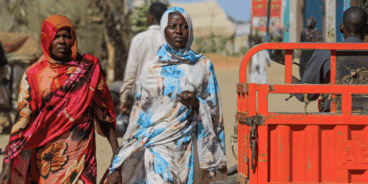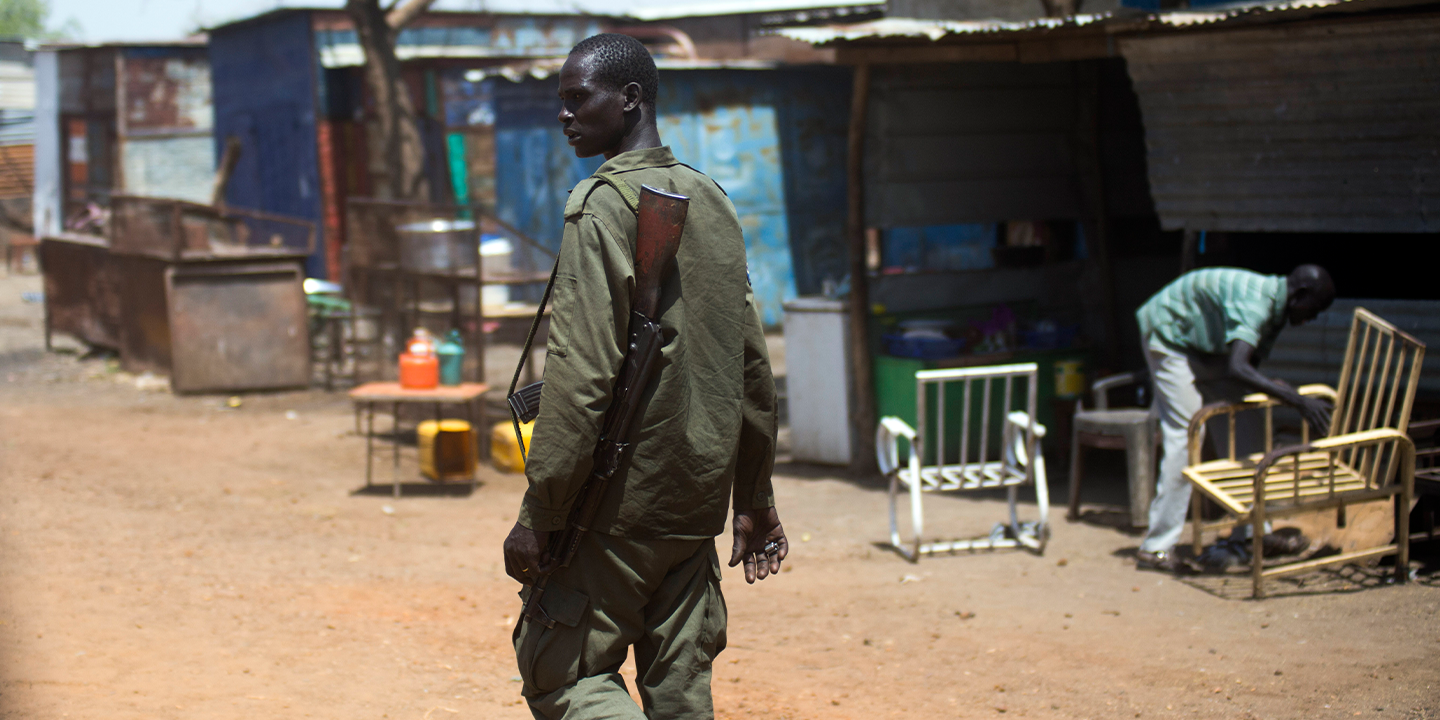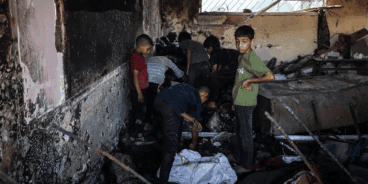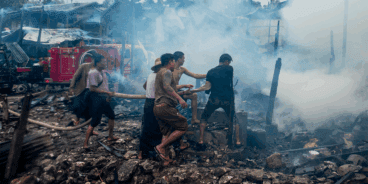

Atrocity Alert No. 441: South Sudan, Ukraine and Democratic Republic of the Congo
Atrocity Alert is a weekly publication by the Global Centre for the Responsibility to Protect highlighting situations where populations are at risk of, or are enduring, mass atrocity crimes.
UN SECURITY COUNCIL MUST RENEW SOUTH SUDAN’S ARMS EMBARGO AMID RISING VIOLENCE
On 23 May UN High Commissioner for Human Rights Volker Türk issued a stark warning about the rapidly deteriorating human rights situation in South Sudan. High Commissioner Türk stressed, “The escalating hostilities in South Sudan portend a real risk of further exacerbating the already dire human rights and humanitarian situation and undermining the country’s fragile peace process.” According to the UN Office for the Coordination of Humanitarian Affairs, at least 180 people have been killed, over 250 injured and an estimated 125,000 displaced between March and mid-April.
Since February the country has seen a sharp rise in violence, arbitrary detentions and hate speech. The rising tensions in South Sudan were initially triggered by a series of attacks and clashes in Nasir County, Upper Nile State, and has since expanded to Central Equatoria, Jonglei and Unity states. The Office of the UN High Commissioner for Human Rights recorded a significant escalation in hostilities between 3 and 20 May, with reports of indiscriminate aerial bombardments, as well as river and ground offensives by South Sudan’s national army – the South Sudan People’s Defence Forces – against positions of the Sudan People’s Liberation Army-In Opposition in parts of Fangak, Jonglei State, and Tonga County, Upper Nile State.
This warning comes amid deepening political unrest, including the detention of opposition leaders and allies of Vice President Riek Machar. In March security forces surrounded Machar’s residence, effectively placing him under house arrest – marking a concerning shift in the country’s internal political dynamics. Although some detainees have since been released, the situation remains volatile, and Machar is believed to still be under house arrest. In response to the rising tensions, Uganda deployed special forces to the capital, Juba, in March to protect President Kiir – an action that violates the existing UN arms embargo.
The current situation demands immediate and unified efforts from both national and international actors to stop the violence, reinforce the peace deal – the Revitalized Agreement – and implement lasting political solutions. Tomorrow, 29 May, the UN Security Council is scheduled to vote on renewing South Sudan’s sanctions regime, including the arms embargo. Continued access to weapons risks not only fueling conflict, civilian casualties, human rights abuses and displacement, but also further undermining efforts toward political stability and reconciliation. Without the arms embargo and sanctions regime, the risk of South Sudan descending into renewed civil war could increase significantly.
African Union members on the Security Council have a particular responsibility to support the embargo’s renewal. Doing so aligns with their commitments under the Silencing the Guns initiative, which aims to end conflict and ensure long-term stability in Africa. Supporting this initiative is vital role to reducing the risk of atrocity crimes by limiting access to illicit weapons used to commit them.
ESCALATION IN UKRAINE UNDERSCORES NEED FOR CIVILIAN PROTECTION AND PEACE EFFORTS
Since 24 May Russian forces have launched the most extensive aerial assault on Ukraine since the full-scale invasion began in February 2022. Over the course of 24 May alone, Russian forces launched 367 drones and missiles targeting multiple cities – including Kyiv, Kharkiv and Mykolaiv – killing at least 12 civilians, including three children. According to Ukrainian government officials, while the country’s air defense systems intercepted a significant number of the missiles, the overwhelming volume still caused widespread destruction. Targeted attacks on civilians and civilian infrastructure are prohibited under international law and may amount to war crimes.
This escalation followed a rare diplomatic breakthrough – a prisoner exchange that began on 23 May in which “1,000 for 1,000” people were returned to each side. The exchange was the primary outcome of a direct round of peace talks on 16 May – the first between the two countries since the early stages of the conflict. Ukraine has previously proposed a 30-day ceasefire to create space for renewed negotiations. However, the process remains stalled, with Russian President Vladimir Putin continuing to insist on conditions that Ukraine deems unacceptable.
In a statement on 26 May UN High Commissioner for Human Rights Volker Türk urged, “It is time to put an end to Russia’s invasion of Ukraine, to commit to – and implement – a comprehensive ceasefire that stops the daily killing and destruction, and to start genuine peace negotiations, built on respect for international law… To achieve a sustainable solution, it is imperative to put people and their human rights first.”
The latest wave of attacks comes amid growing concerns over the impact of the conflict on children. From January to April 2025 at least 220 children in Ukraine were killed or injured in attacks – a 40 percent increase compared to the same period last year, according to the UN Children’s Fund (UNICEF). Munir Mammadzade, UNICEF Representative to Ukraine, said, “As attacks continue with a pattern of increasing child casualties, we fear that more young lives will be devastated. This latest series of attacks has impacted multiple regions in country, including those far from the frontline – another brutal reminder that nowhere in Ukraine is safe for children.”
While the international community continues to call for peace, any durable resolution must prioritize the protection of civilians and accountability. The Global Centre for the Responsibility to Protect’s Ukraine expert, Sarah Hunter, said, “President Putin consistently escalates attacks on civilians around ceasefires or other negotiations – tactics that aim to boost Russia’s leverage while undermining Ukraine’s resolve. The international community must keep supporting Ukraine’s air defenses to protect civilians living under the daily threat of bombardment and find innovative ways to pressure Russia toward peace. Ukraine’s population cannot continue to bear the cost of stalled negotiations.”
MOUNTING WAR CRIMES IN EASTERN DR CONGO AMID PEACE TALKS
Evidence continues to mount of war crimes perpetrated by a coalition of Congolese army-backed militias – known as the “Wazalendo” – and the Rwandan-backed March 23 Movement (M23) in eastern Democratic Republic of the Congo (DRC). In a report released 27 May, Amnesty International documented serious abuses by M23 in Goma and Bukavu, including killings, torture, enforced disappearances and inhumane detention conditions. M23 has arbitrarily detained civilians, often holding them hostage for ransom and requiring families to pay large sums for their release. Testimonies also describe how M23 brutally punishes those it perceives as opponents and uses intimidation to suppress dissent.
On 23 May Human Rights Watch (HRW) reported widespread abuses by the Wazalendo in South Kivu, including killings, beatings and extortion – sometimes carried out along ethnic lines. While the degree of command and control by the Congolese armed forces (FARDC) over the Wazalendo remains unclear, the government risks complicity in these crimes by continuing to support the coalition.
Fighting between M23 and the FARDC has escalated dramatically in recent months. M23 has made rapid advances across North and South Kivu, seizing key territory, including provincial capitals. Over 7,000 people have been killed, and hundreds of thousands forced to flee. Simultaneously, the Wazalendo have taken control of multiple localities in South Kivu. HRW notes that both parties have appealed to ethnic prejudices, fueling waves of discrimination and abuses. Wazalendo attacks frequently target the Banyamulenge community, Congolese Tutsis long accused of supporting M23.
Amid the deteriorating situation in eastern DRC, the United States (US) is mediating a peace deal between Rwanda and the DRC that is expected to be signed in June. While the agreement reportedly includes a critical minerals component to attract US and multinational investment, it risks reinforcing the dynamics that fuel conflict if accountability and addressing the root causes are not central to its framework. Competition for control of profitable minerals has contributed to a thriving conflict-economy that fuels resource exploitation and recurrent violence against civilians. Rwanda has been accused of smuggling Congolese minerals across the border, while both M23 and the Wazalendo profit from territorial control and extortion.
As negotiations progress, all stakeholders must ensure that any agreement centralizes human rights, the protection of civilians and environmental protections and includes concrete commitments to end state support for armed groups like M23 and the Wazalendo. Stakeholders must also strengthen due diligence and supply chain regulations and sanction actors benefiting from conflict resources. Congolese authorities should disarm the Wazalendo and investigate and prosecute all those responsible for war crimes. International actors should support the International Criminal Court’s renewed investigation in the DRC and the UN Human Rights Council-mandated Fact-Finding Mission. Independent monitoring bodies must be granted access to detention sites, particularly those under M23 control.
Related Content


Atrocity Alert No. 450: Education Under Attack, Democratic Republic of the Congo and Syria
